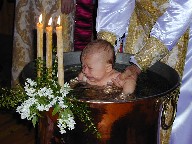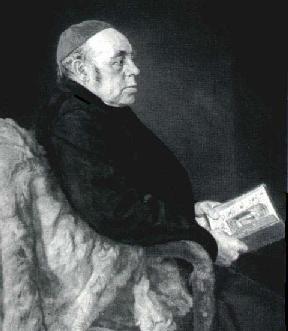John Calvin, from his commentary on the synoptics (Matthew 3:11-12; Mark 1:7-8; Luke 3:15-18), writing about the relation of John’s baptism to Christian baptism:
Hence we infer, that his intention was not at all to distinguish between his own baptism, and that which Christ taught his disciples, and which he intended should remain in perpetual obligation in his Church. He does not contrast one visible sign with another visible sign, but compares the characters of master and servant with each other, and shows what is due to the master, and what is due to the servant. It ought not to have any weight with us, that an opinion has long and extensively prevailed, that John�s baptism differs from ours. We must learn to form our judgment from the matter as it stands, and not from the mistaken opinions of men. And certainly the comparison, which they imagine to have been made, would involve great absurdities. It would follow from it, that the Holy Spirit is given, in the present day, by ministers. Again, it would follow that John�s baptism was a dead sign, and had no efficacy whatever. Thirdly, it would follow, that we have not the same baptism with Christ: for it is sufficiently evident, that the fellowship, which he condescends to maintain with us, was ratified by this pledge, when he consecrated baptism in his own body.
We must therefore hold by what I have already said, that John merely distinguishes, in this passage, between himself and the other ministers of baptism, on the one hand, and the power of Christ, on the other, and maintains the superiority of the master over the servants. And hence we deduce the general doctrine, as to what is done in baptism by men, and what is accomplished in it by the Son of God. To men has been committed nothing more than the administration of an outward and visible sign: the reality dwells with Christ alone.
Scripture does sometimes, though not in a literal sense, ascribe to men what John here declares not to belong to men, but claims exclusively for Christ. In such cases, however, the design is not to inquire, what man has separately and by himself, but merely to show, what is the effect and advantage of signs, and in what manner God makes use of them, as instruments, by his Spirit. Here also is laid down a distinction between Christ and his ministers, that the world may not fall into the mistake, of giving to them what is justly due to him alone: for there is nothing to which they are more prone, than to adorn creatures with what has been taken from God by robbery. A careful attention to this observation will rid us of many difficulties. We know what disputes have arisen, in our own age, about the advantage and efficacy of signs, all of which may be disposed of in a single word. The ordinance of our Lord, viewed as a whole, includes himself as its Author, and the power of the Spirit, together with the figure and the minister: but where a comparison is made between our Lord and the minister, the former must have all the honor, and the latter must be reduced to nothing.
This was Calvin’s settled opinion: he preached it to his congregation (Sermons on the Deity of Christ, Second Sermon on the Ascension of Christ):
So then, seeing that we are inclined to the vice of exalting creatures and robbing Jesus Christ of His glory, let us hold all the more firmly the saying that �John baptized with water� to show that, if we have to do with any grace, we must come neither to Peter nor to John, but to Jesus Christ, of Whom it is said that He received the grace of God, not at all in part, but in fullness, to show that we must address ourselves to Him alone. Besides, some have taken this as an occasion to say that the Baptism of John was not perfect. But this is an abuse. For the intention of John, when he spoke thus, was not to declare the truth of the Sacrament which he administered, but only the difference between his person and that of Jesus Christ. Although, then, the Sacrament of Baptism administered by John, and that which Jesus Christ administered, are the same Sacrament, and tending to the same end, yet John declares that he has not power to give worth to Baptism, but this belongs to Jesus Christ. There is, then, no doubt at all that it is the true Baptism which he administers, for we do not look at the sign but at the truth, and yet the sign is conformable to that of Jesus Christ. But the principal thing that we have with respect to Baptism consists in two points: it is that we are stripped of the old Adam, renewed and united to Jesus Christ, and that we are purged of all our spots when God pardons us of our sins. That is the sum of Baptism.
Now let us see if John did all that. It is certain. For he came preaching the remission of sins, and administering Baptism to this end. Further, in baptizing he preached repentance, which implies what we have said, that we be put to death with respect to our selves, and that this corruption that we have from Adam be abolished, in order that the justice of God rule in us. So when we shall have examined this quite well, we shall find nothing else here. But why? It is very necessary to distinguish between the person of the minister and the person of Jesus Christ. True it is that when one speaks of Baptism in itself, it is the washing away of our sins. Why so? Because by this we are confirmed that we have entered into Jesus Christ, in order that we may be purified and that we may live by His power. Scripture speaks thus. As we see that when Ananias baptizes St. Paul, he says to him, �Come and wash away your sins.� (Acts 9:18, Acts 22:16.) But also it is not only a matter of the sign when one speaks of Baptism, but of the truth there signified: namely, of being acceptable to God through the remission of sins, of being renewed by His Holy Spirit, in order that we may live no longer to ourselves. And why do we say that all that is comprehended in Baptism? Because the commission of Jesus Christ is without doubt and certain; and He accomplishes inwardly what it signifies outwardly. Otherwise it would be playing a farce upon a stage, if reality were not joined with the sign. This, then, is how God joins reality with the sign, in order that we may know that, just as the visible sign signifies, so we receive the graces there signified. So it could be said of the Supper. When we receive the Supper, as the minister distributes to us the bread and the wine, Jesus Christ makes us partakers of His body and His blood, in order that we may be truly His members; and by this means it is said that the Supper is the communication of the body and blood of our Lord. But when it comes to treating the part that mortal man does, then we must consider what power he has. When I baptize, is that to say I have the Holy Spirit up my sleeve to give it? Or the body and blood of the Lord to give it to whomever it seems good to me? It would be climbing too high to wish to attribute to mortal creatures what belongs to Jesus Christ. Let us not, at all, then, take away from the office of Jesus Christ, which is to baptize by the Holy Spirit. Just as I take water to baptize, Jesus Christ accomplishes what I signify, and He accomplishes it by His own power.
This, then, is what John says, �I baptize with water, but Jesus Christ baptizes by the Holy Spirit.� This is what is here treated, and will be again in the eleventh chapter. Besides, now we must speak in like language: namely it is not up to us to perfect the things which we signify. Yet nevertheless we must be certain that God accomplished what is signified by the sign, and that, just as the washing away of sins is signified by water, so He accomplishes it by His blood. This is how we must distinguish the person of Jesus Christ and the person of the minister, in order that each may be in his degree and in his measure, and that it may be known that all perfection comes from this Fountain.
Now, of course, this is one side of the story: Calvin is not going to be so unbalanced as to say nothing but the above: and so, a little later in the same sermon, against the papists he says this:
As for us, let us learn that the reality of Baptism is not in the water, but in the Holy Spirit. Yet the sign is not useless. For it testifies to us that our souls are washed. But to have the reality we must come to the Spirit, as we have shown. Further, the Holy Spirit is given through Jesus Christ, in order that we may not come to seek the Spirit in the water or in men, but that we may look on high. And this is still a point which the world has abased. For who looks at Jesus Christ, when it is a matter of having something for our salvation? No one. For it seems to us that men have full mastery, as if Jesus Christ had resigned His office and He were no longer in heaven at all. That is how dull-witted men are.
Leaving the digression occasioned by the flow of the above quotations, we return to the major point. Calvin considered John’s baptism identical to Christian baptism. Now at this point a question may arise: If John’s baptism has carried into the Christian church, why did Paul rebaptize those who were baptized with John’s baptism (Acts 19:1-7)? Here is Calvin’s explanation of that point, in his commentary on Acts 19:1-7:
1. Luke showeth here that the Church of Ephesus was not only confirmed and increased by Paul�s return, but also that there was a miracle wrought there, because the visible graces of the Spirit were given to certain rude and new disciples. Furthermore, it is not known whether they were inhabitants of the city or strangers; neither doth it greatly skill. It is not to be doubted but that they were Jews, because they had received the baptism of John; also, it is to be thought that they dwelt at Ephesus when Paul found them there.
2. Whether they had received the Holy Ghost. The end of the history doth show that Paul doth not speak in this place of the Spirit of regeneration, but of the special gifts which God gave to divers at the beginning of the gospel, for the common edifying of the Church. But now upon this interrogation of Paul ariseth a question, whether the Spirit were common to all everywhere at that time? For if he were given only to a few, why doth he join him with faith, as if they were so linked together that they could not be separate? Peradventure, they were none of the common sort; or because they were an indifferent number, that is, twelve, Paul demandeth whether they were all without the gifts of the Spirit. Notwithstanding, I think thus, that so many Jews were offered in presence of the Gentiles, not by chance, but by the counsel of God; and that at one time being disciples, that is, of the number of the faithful, who did notwithstanding confess that they were ignorant of the principal glory of the gospel, which was apparent in spiritual gifts, that by them Paul�s ministry might be beautified and set forth. For it is unlike that Apollos left so few disciples at Ephesus; and he might have taught them better, since that he learned the way of the Lord perfectly of Priscilla and Aquila.
Moreover, I do not doubt but that the brethren of whom Luke spake before were other than these. In sum, when Paul seeth that these men do profess the name of Christ, to the end he may have a more certain trial of their faith, he asketh them whether they have received the Holy Ghost. For it appeareth by Paul himself that this was a sign and token of the grace of God to establish the credit of doctrine; I would know of you whether ye received the Holy Ghost by the works of the law, or by the hearing of faith (Galatians 3:2).
We know not whether there be any Holy Ghost. How could it be, that men being Jews heard nothing of the Spirit, concerning which the prophets speak everywhere, and whose commendations and titles are extant in the whole Scripture? Surely we gather by this that Paul did neither speak generally of the Spirit; and that these men, as they were asked, did deny that they knew those visible graces wherewith God had beautified the kingdom of his Son. Therefore, they confess that they know not whether God give such gifts. Therefore, there is in the word Spirit the figure metonymia. And this sense doth that confirm that if they had altogether denied that they knew anything concerning the Spirit of God, Paul would not have passed over with silence such a gross error; yea, an error altogether monstrous. When he demandeth to what end, or how they were baptized, he showeth therewithal, that wheresoever Christ had been soundly and thoroughly preached the visible graces did also appear, that such worship might be common to all churches. Wherefore, no marvel if Paul wonder that the faithful are ignorant of such glory of Christ, which God would have to be apparent everywhere at that time; and a correction immediately, he telleth them that they must not stay in those rudiments which they had learned; because it was John�s office to prepare disciples for Christ.
4. John truly. Paul�s admonition tended to this end, that these men being convict of their ignorance might desire to go forward. He saith that John preached of Christ who was to come. Therefore he sent out his disciples, that running in the course they might go towards Christ who was not as yet revealed. Wherefore, to the end these men may not flatter themselves, and refuse to go forward, he showeth that they be yet far from the mark. For the feeling of want doth enforce men to desire that which is as yet lacking. The sum cometh to this end, as if Paul had said Before Christ was glorified, this power of his did not appear in the world; when he was ascended into heaven he would have his kingdom to flourish thus. Therefore the graces of the Spirit were much less shed out when John was as yet in the course of his embassage, which do now declare that Christ sitteth at the right hand of his Father forasmuch as he had not as then openly showed himself to be the Redeemer of the world. Therefore know ye that you must go farther forward; because ye be far from the mark. So that he doth plainly show that the faith of the godly who had been taught by John ought to have looked unto Christ who was to come, lest these men should stand still being newly entered, without going any farther.
And even by this also are we taught that the baptism of John was a token of repentance and remission of sins and that our baptism at this day doth not differ any thing from it, save only that Christ is already revealed, and in his death and resurrection our salvation is made perfect: and so baptism was brought unto his effect; because out of that fountain of Christ�s death and resurrection whereof I have spoken, floweth repentance, and thither is faith referred again that it may thence fet free righteousness. In sum, Paul showeth plainly that that was the baptism of regeneration and renovation as is ours. And because both purging and newness of life doth flow from Christ alone he saith that it was grounded in his faith, by which words we be also taught, that hereupon dependeth all the force of baptism, that we lay hold upon by faith in Christ whatsoever baptism doth figure; so far off is it, that the outward sign doth derogate from or diminish the grace of Christ any iota.
5. When they heard these things. Because the men of old had conceived an opinion that the baptism of John and of Christ were diverse, it was no inconvenient thing for them to be baptized again, who were only prepared with the baptism of John. But that that diversity was falsely and wickedly by them believed, it appeareth by this, in that it was a pledge and token of the same adoption, and of the same newness of life, which we have at this day in our baptism; and, therefore, we do not read that Christ did baptize those again who came from John unto him. Moreover, Christ received baptism in his own flesh, that he might couple himself with us by that visible sign, (Matthew 3:15) but if that reigned diversity be admitted, this singular benefit shall fall away and perish, that baptism is common to the Son of God and to us, or that we have all one baptism with him. But this opinion needeth no long refutation, because to the end they may persuade that these two baptisms be diverse, they must needs show first wherein the one differeth from the other; but a most excellent likelihood answereth on both parts, and also the agreement and conformity of the parts, which causeth us to confess that it is all one baptism. Now the question is, whether it were lawful to repeat the same; and furious men in this our age; trusting to this testimony, went about to bring in baptizing again. Some take baptism for new institution or instruction, of whose mind I am not, because, as their exposition is too much racked, so it smelleth of a starting-hole.
Other some deny that baptism was repeated; because they were baptized amiss by some foolish enemy of John. But because their conjecture hath no color; yea, the words of Paul do rather import that they were the true and natural disciples of John, and Luke doth honorably call them disciples of Christ; I do not subscribe to this opinion, and yet deny that the baptism of water was repeated, because the words of Luke import no other thing, save only that they were baptized with the Spirit. First, it is no new thing for the name of baptism to be translated unto the gifts of the Spirit, as we saw in the first and in the eleventh chapters, (Acts 1:5, and Acts 11:6) where Luke said, that when Christ promised to his apostles to send the Spirit visible, he called it baptism.
Also, that when the Spirit came down upon Cornelius, Peter remembered the words of the Lord, �Ye shall be baptized with the Holy Ghost.� Again, we see that those visible gifts are spoken of by name in this place, and that the same are given with baptism. And whereas it followeth immediately, that when he had laid his hands upon them, the Spirit came, I take it to be added by way of interpretation; for it is a kind of speaking much used in the Scripture, first to set down a thing briefly, and afterwards to make it more plain. Therefore, that which by reason of brevity was somewhat obscure, doth Luke better express and lay more open, saying, that by laying on of hands the Spirit was given them. If any man object, that when baptism is put for the gifts of the Spirit, it is not taken simply, but having somewhat added to it. I answer, that Luke�s meaning doth sufficiently appear by the text; and again, that Luke doth allude unto the baptism whereof he spake. And surely if you understand it of the external sign, it shall be an absurd thing that it was given them without using any better doctrine. But and if you take it metaphorically for institution, the speech shall be as yet harsh; and the narration should not agree, that after they were taught the Holy Ghost came down upon them.
Furthermore, as I confess that this laying on of hands was a sacrament, so I say that those fell through ignorance who did continually imitate the same. For seeing that all men agree in this, that it was a grace which was to last only for a time, which was showed by that sign, it is a perverse and ridiculous thing to retain the sign since the truth is taken away. There is another respect of baptism and the supper, wherein the Lord doth testify that those gifts are laid open for us, which the Church shall enjoy even until the end of the world. Wherefore we must diligently and wisely distinguish perpetual sacraments from those which last only for a time, lest vain and frivolous visures have a place among the sacraments. Whereas the men of old time did use laying on of hands, that they might confirm the profession of faith in those who were grown up, I do not mislike it; so that no man think that the grace of the Spirit is annexed to such a ceremony, as doth Jerome against the Luciferians. But the Papists are worthy of no pardon, who being not content with the ancient rite, durst thrust in rotten and filthy anointing, that it might be not only a confirmation of baptism, but also a more worthy sacrament, whereby they imagine that the faithful are made perfect who were before only half perfect, � whereby those are armed against the battle, who before had their sins only forgiven them. For they have not been afraid to spew out these horrible blasphemies.
To this discussion of the objection from Acts 19 may be added Calvin’s statement on this point in Institutes, IV.15.18
But they seem to think the weapon which they brandish irresistible, when they allege that Paul rebaptized those who had been baptized with the baptism of John (Acts 19:3, 5). For if, by our confession, the baptism of John was the same as ours, then, in like manner as those who had been improperly trained, when they learned the true faith, were rebaptized into it, ought that baptism which was without true doctrine to be accounted as nothing, and hence we ought to be baptized anew into the true religion with which we are now, for the first time, imbued? It seems to some that it was a foolish imitator of John, who, by a former baptism, had initiated them into vain superstition. This, it is thought, may be conjectured from the fact, that they acknowledge their entire ignorance of the Holy Spirit, an ignorance in which John never would have left his disciples. But it is not probable that the Jews, even though they had not been baptized at all, would have been destitute of all knowledge of the Spirit, who is celebrated in so many passages of Scripture. Their answer, therefore, that they knew not whether there was a Spirit, must be understood as if they had said, that they had not yet heard whether or not the gifts of the Spirit, as to which Paul questioned them, were given to the disciples of Christ. I grant that John�s was a true baptism, and one and the same with the baptism of Christ. But I deny that they were rebaptized (see Calv. Instruct. Adv. Anabapt.). What then is meant by the words, �They were baptized in the name of the Lord Jesus �? Some interpret that they were only instructed in sound doctrine by Paul; but I would rather interpret more simply, that the baptism of the Holy Spirit, in other words, the visible gifts of the Holy Spirit, were given by the laying on of hands. These are sometimes designated under the name of baptism. Thus, on the day of Pentecost, the apostles are said to have remembered the words of the Lord concerning the baptism of the Spirit and of fire. And Peter relates that the same words occurred to him when he saw these gifts poured out on Cornelius and his family and kindred. There is nothing repugnant to this interpretation in its being afterwards added, �When Paul had laid his hands upon them, the Holy Ghost came on them� (Acts 19:6). For Luke does not narrate two different things, but follows the form of narrative common to the Hebrews, who first give the substance, and then explain more fully. This anyone may perceive from the mere context. For he says, �When they heard this they were baptized in the name of the Lord Jesus. And when Paul laid his hands upon them, the Holy Ghost came on them.� In this last sentence is described what the nature of the baptism was. But if ignorance vitiates a former, and requires to be corrected by a second baptism, the apostles should first of all have been rebaptized, since for more than three full years after their baptism they had scarcely received any slender portion of purer doctrine. Then so numerous being the acts of ignorance which by the mercy of God are daily corrected in us, what rivers would suffice for so many repeated baptisms?
In addition, the relation of John’s baptism and Christian baptism is discussed very clearly in Institutes, IV.15.6-8:
Thus first John baptized, and thus afterwards the apostles by the baptism of repentance for the remission of sins, understanding by the term repentance, regeneration, and by the remission of sins, ablution.
7. This makes it perfectly certain that the ministry of John was the very same as that which was afterwards delegated to the apostles. For the different hands by which baptism is administered do not make it a different baptism, but sameness of doctrine proves it to be the same. John and the apostles agreed in one doctrine. Both baptized unto repentance, both for remission of sins, both in the name of Christ, from whom repentance and remission of sins proceed. John pointed to him as the Lamb of God who taketh away the sins of the world (John 1:29), thus describing him as the victim accepted of the Father, the propitiation of righteousness, and the author of salvation. What could the apostles add to this confession? Wherefore, let no one be perplexed because ancient writers labor to distinguish the one from the other. Their views ought not to be in such esteem with us as to shake the certainty of Scripture. For who would listen to Chrysostom denying that remission of sins was included in the baptism of John (Hom. in Matthew 1:14), rather than to Luke asserting, on the contrary, that John preached �the baptism of repentance for the remission of sins�? (Luke 3:3). Nor can we admit Augustine�s subtlety, that by the baptism of John sins were forgiven in hope, but by the baptism of Christ are forgiven in reality. For seeing the Evangelist clearly declares that John in his baptism promised the remission of sins, why detract from this eulogium when no necessity compels it? Should anyone ask what difference the word of God makes, he will find it to be nothing more than that John baptized in the name of him who was to come, the apostles in the name of him who was already manifested (Luke 3:16; Acts 19:4).
8. This fact, that the gifts of the Spirit were more liberally poured out after the resurrection of Christ, does not go to establish a diversity of baptisms. For baptism, administered by the apostles while he was still on the earth, was called his baptism, and yet the Spirit was not poured out in larger abundance on it than on the baptism of John. Nay, not even after the ascension did the Samaritans receive the Spirit above the ordinary measure of former believers, till Peter and John were sent to lay hands on them (Acts 8:14-17). I imagine that the thing which imposed on ancient writers, and made them say that the one baptism was only a preparative to the other, was, because they read that those who had received the baptism of John were again baptized by Paul (Acts 19:3-5; Matthew 3:11). How greatly they are mistaken in this will be most clearly explained in its own place. Why, then, did John say that he baptized with water, but there was one coming who would baptize with the Holy Ghost and with fire? This may be explained in a few words. He did not mean to distinguish the one baptism from the other, but he contrasted his own person with the person of Christ, saying, that while he was a minister of water, Christ was the giver of the Holy Spirit, and would declare this virtue by a visible miracle on the day on which he would send the Holy Spirit on the apostles, under the form of tongues of fire. What greater boast could the apostles make, and what greater those who baptize in the present day? For they are only ministers of the external sign, whereas Christ is the Author of internal grace, as those same ancient writers uniformly teach, and, in particular, Augustine, who, in his refutation of the Donatists, founds chiefly on this axiom, Whoever it is that baptizes, Christ alone presides.
Now my own take on this is that Calvin is right in identifying John’s baptism with Christian baptism. John’s baptism was a baptism of repentance unto the remission of sins (Mark 1:4). When Peter preaches on the day of Pentecost and his hearers are pricked in their hearts and ask what to do Peter replies: �Repent, and be baptized every one of you in the name of Jesus Christ for the remission of sins, and ye shall receive the gift of the Holy Ghost.� (Acts 2:38). Here we find the same elements: repentance; baptism; remission of sins. But I am not satisfied with Calvin’s explanation concerning the people in Acts 19 who were (re)baptized. I think they weren’t really baptized with John’s baptism �after all, John spoke of the Holy Spirit (e.g., John 1:34). And just as most Christians wouldn’t accept Mormon baptism (since in spite of their use of the orthodox formula they are really pagans), Paul couldn’t accept such a baptism as this, even if it were called �John’s�. Now this would also explain why Jesus’ disciples baptized contemporaneously with John (John 4:1,2 �I understand that there is another interpretation, but that would take me too far afield in an already massive post) �there was no difference in the baptisms. Of course, now we have been given the baptismal formula: but the essential meaning is much as it ever was.












